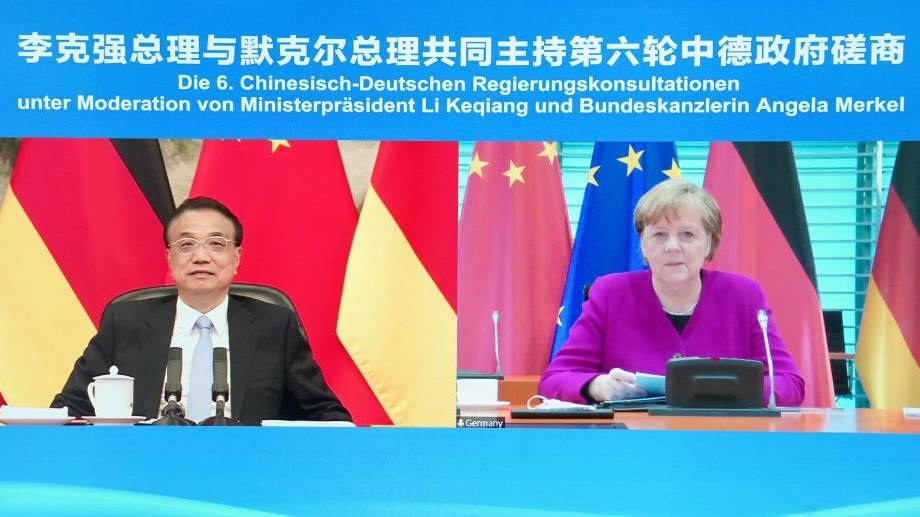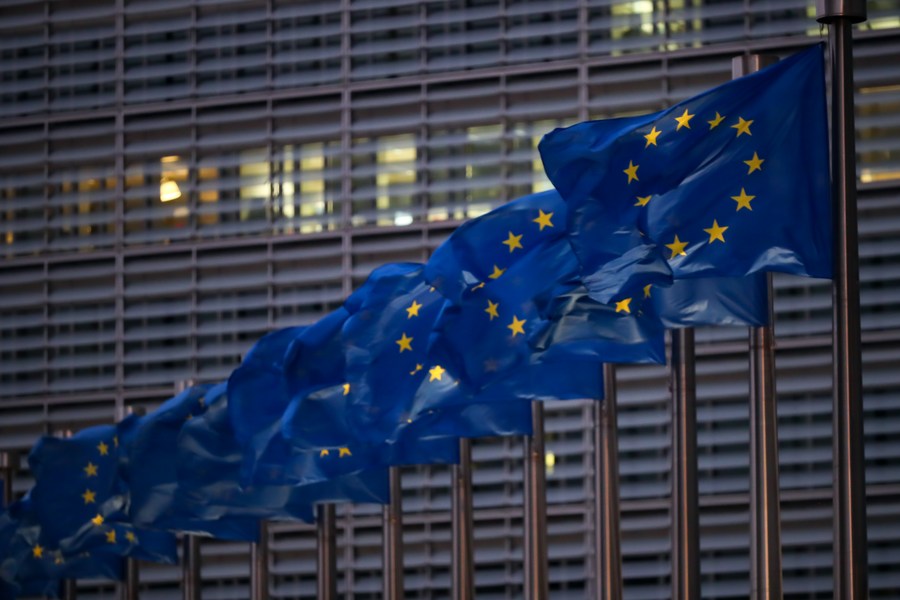
Chinese Premier Li Keqiang co-chairs the sixth China-Germany intergovernmental consultation with German Chancellor Angela Merkel via video link in Beijing, capital of China, April 28, 2021. /Xinhua
Chinese Premier Li Keqiang co-chairs the sixth China-Germany intergovernmental consultation with German Chancellor Angela Merkel via video link in Beijing, capital of China, April 28, 2021. /Xinhua
Editor's note: Thomas O. Falk is a London-based political analyst and commentator. He holds a Master of Arts in international relations from the University of Birmingham and specializes in U.S. affairs. The article reflects the author's opinions and not necessarily the views of CGTN.
Despite differences of opinion on some domestic political issues, Germany and China seek to deepen cooperation in business, climate protection and the health sector. It is the result of the German-Chinese government consultations conducted online for the first time on April 28.
The biannual meeting was the sixth of its kind since 2011. Merkel drew a positive balance of the consultations, which she described as a "good tradition." The chancellor also emphasized that her successor should continue with it.
The meeting was also seen as a success from the Chinese side. It displayed the importance attached to Sino-German relations and "pragmatic cooperation," said Chinese Premier Li Keqiang.
Li also urged to cease "unnecessary interference." The principle of "mutual non-interference in internal affairs" was one of the prerequisites for "smooth dialogue and cooperation."
Unlike other Western leaders, Merkel has traditionally dealt with China via a quasi-realpolitik approach during her term of office. Instead of making countless accusations, and albeit she expressed her desire to open a dialogue on human rights, Merkel praised the existing cooperation and the declarations of intent for stronger collaboration in climate research and in the areas of the environment, climate change and sustainable development that Berlin and Beijing have signed.
Another focus was the pandemic. Here, too, unity exists, and cooperation was pledged. For example, Merkel advocated mutual recognition of vaccines and open and transparent exchange of information.
Both sides focused on common intersections, something Merkel often tried to sell within Europe.
The Sino-German cooperation is a blueprint of how cooperation between states with different government models and views can benefit both sides.
China is and will remain Germany's most important trade partner for goods. The trading volume was over 212 billion euros in 2020 alone. Even during the pandemic, Germany continues to import exorbitant amounts, while China continues to import German cars and machines.
Merkel's modus operandi is a stark contrast to the European Union's general approach.

EU flags flying outside the European Commission headquarters in Brussels, Belgium, December 24, 2020. /Xinhua
EU flags flying outside the European Commission headquarters in Brussels, Belgium, December 24, 2020. /Xinhua
In March, the latter imposed sanctions on Chinese individuals who Brussels held responsible for the alleged persecution of the Uygurs. The Chinese government promptly imposed counter-sanctions. This unnecessary cycle has now called into question the extremely future-relevant investment agreement between Beijing and Brussels that Merkel promoted during her EU Council Presidency.
One can hence conclude that while relations between China and Brussels are complicated now, Berlin and Beijing have found a way to advance cooperation successfully.
With the election in September, however, this German-Sino status quo could be called into question. With Merkel's departure, Beijing might be losing a crucial advocate.
Merkel's party, the Christian Democratic Union (CDU), is currently divided on China. One side favors a model that would want a more rigid approach to China. The other, based on Merkel-esque realpolitik, is cognizant that good relations with China are in mutual interest. The CDU's candidate for chancellor, Armin Laschet, is arguably the individual who would come the closest to a continuation of Merkel's approach.
The situation is different with the Green Party, however. It could change Germany's China policy lastingly. Its candidate for chancellor, Annalena Baerbock, advocates a tougher course toward Beijing. The party also advocates for "close European and transatlantic coordination with China."
The Greens hence make no secret that their approach is not one founded on realpolitik, cooperation where possible and economic interests, but interference in internal affairs.
Then there is the Social Democratic Party (SPD) with its candidate Olaf Scholz. Europe must conduct the dialogue with China on cooperation and competition "in a closed, constructive and critical manner," it says in the party's election manifesto. The vague formulation is intentional. The party will very likely again only be a junior partner in a governing coalition. Should this scenario occur under the lead of the Greens, the SPD will have no quandaries adapting to an anti-China course.
It can therefore be anticipated that from September, and without Merkel, dealings with Beijing could become more complex for Germany.
In view of the cooperation agreements concluded on Wednesday and the economic implications, one can only hope that Brussels's naivety and proclivity to self-harm are not too contagious.
(If you want to contribute and have specific expertise, please contact us at opinions@cgtn.com.)

